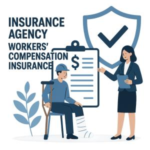
Security Guard Workers’ Comp vs. General Liability: Know the Difference
August 1, 2025
Residential Care Home Workers’ Comp Audit Prep—Step-by-Step
August 1, 2025In Georgia’s security guard industry, claim denials present a notable challenge that can impact both operational efficiency and financial stability. As security firms navigate the complexities of insurance and liability claims, understanding the common causes of denials is crucial to safeguarding business interests.This article delves into the primary reasons claim denials occur within the state’s security sector and offers practical strategies to minimize risks, streamline claims processes, and ensure timely compensation. By proactively addressing these issues, security companies can maintain compliance, enhance service reliability, and protect their bottom line.
Table of contents
- Common Reasons for Claim Denials in Georgia’s Security Guard Sector
- impact of Incomplete Documentation on Claim Approval Rates
- Best Practices for Accurate and Timely Claim Submission
- leveraging Technology to Minimize Errors and expedite Claims Processing
- Q&A
- The Way Forward
Common Reasons for Claim Denials in Georgia’s security Guard Sector
In Georgia’s security guard industry, claim denials often stem from a range of avoidable issues. One prevalent reason is insufficient documentation, where crucial incident reports or proof of injury lack detailed descriptions or timeliness. Another significant factor includes non-compliance with regulatory requirements, such as failing to meet mandatory licensing or training standards before filing a claim.Additionally, claims may be rejected due to incorrect classification of the worker or the nature of the incident being outside the scope of coverage.
Understanding these pitfalls is essential for security firms aiming to safeguard their workforce and financial stability. Common pitfalls also include:
- Delayed reporting of workplace injuries
- Inaccurate or incomplete claim forms
- Failure to follow prescribed medical treatment protocols
- Lack of clear dialog with insurers
| Reason for Denial | Impact |
|---|---|
| Insufficient Documentation | Delayed or denied benefits |
| Non-Compliance with Training | Claim rejection due to policy voidance |
| late injury Reporting | Questioned claim validity |
| Incorrect Worker Classification | Coverage limits or denial |
Impact of Incomplete Documentation on Claim Approval Rates
In the highly regulated security guard industry in Georgia,the accuracy and completeness of claim documentation play a pivotal role in the approval process. Claims submitted with missing or inconsistent information frequently enough face delays or outright denials, directly impacting cash flow and operational stability.Essential documents such as detailed incident reports, witness statements, and proper licensing verification must be meticulously compiled. Failure to provide these critical elements signals potential compliance concerns to claims adjusters and can lead to protracted review periods or rejection.
Organizations that prioritize thorough documentation benefit from significantly higher approval rates. A well-organized claim package demonstrates professionalism and compliance, reducing inquiry volume and expediting settlements. Key factors influencing claim success include:
- Complete client contracts and service logs
- Accurate timekeeping records linked to the incident
- Properly filed incident and injury reports
- Verification of guard certifications and training
| Documentation Element | Effect on Approval Rate |
|---|---|
| Complete Incident Report | +35% |
| Verified Licenses & Certifications | +28% |
| Accurate Time Logs | +22% |
| Missing Witness Statements | -40% |
| Incomplete Contract details | -33% |
Best Practices for Accurate and Timely Claim Submission
Ensuring accuracy and timeliness in claim submissions is paramount in reducing denials within georgia’s security guard industry. Start by establishing a detailed checklist that outlines each step of the submission process. This should include verifying client authorization, confirming job site details, and accurately documenting hours worked. Implementing a double-check system where one team member reviews the claim before submission can catch common errors such as mismatched dates or missing signatures,which are frequent causes of rejection.
Additionally, adopting technology solutions tailored for security services can streamline data collection and expedite claim processing. Automated timekeeping systems integrated with payroll reduce manual input errors, while alert features notify supervisors when claims approach submission deadlines. To further enhance efficiency, consider regular training sessions focused on updates to state regulations and billing standards. The following table highlights key best practices with their primary benefits:
| Best Practice | Benefit |
|---|---|
| Pre-submission Review | Minimizes errors and omissions |
| Use of Automated Systems | Increases data accuracy and submission speed |
| Regular Training sessions | Keeps staff updated on compliance and billing changes |
| clear Documentation Procedures | ensures consistent and reliable record-keeping |
Leveraging Technology to Minimize Errors and Expedite Claims Processing
Implementing advanced software solutions can significantly reduce human errors frequently enough associated with manual claims filing. Automated data entry tools ensure that information is accurately captured and consistently formatted, minimizing the risk of denial due to clerical mistakes or incomplete documentation.Additionally, cloud-based platforms enhance collaboration between security firms, insurers, and regulators by providing real-time updates and seamless communication channels, accelerating the overall claims process.
Security companies can further improve efficiency by integrating artificial intelligence (AI) driven analytics that flag potential discrepancies before claims are submitted. these systems not only pinpoint missing fields but also verify policy compliance, enabling proactive corrections that prevent costly rejections.Below is a comparison of customary versus technology-enhanced claims processing in the industry:
| Aspect | Traditional Process | Technology-Enhanced Process |
|---|---|---|
| Data Accuracy | High risk of entry errors | Automated validation reduces errors |
| Processing Time | Weeks to months | Days to hours |
| Compliance Checks | Manual review | Real-time AI monitoring |
| Communication | Email and paper-based | Instant cloud collaboration |
Q&A
Q&A: Claim Denials in Georgia’s Security Guard Industry-and How to Avoid Them
Q1: What are the most common reasons for claim denials in Georgia’s security guard industry?
A1: Common reasons include insufficient documentation, lack of compliance with state licensing requirements, incomplete incident reports, late claim submissions, and failure to demonstrate that the event falls within covered policy terms. Additionally, inadequate training records or non-adherence to contractual obligations can prompt denials.
Q2: How does Georgia’s regulatory environment impact claim approvals within the security guard sector?
A2: Georgia’s licensing and operational regulations require security firms to comply with strict standards concerning training, certification, and conduct. Non-compliance can lead to claim denials, as insurers often verify adherence to these regulations before approving claims related to liability or workers’ compensation.
Q3: What role does proper documentation play in avoiding claim denials?
A3: Meticulous documentation is crucial. This includes incident reports, witness statements, time logs, training certifications, and maintenance of equipment records. Proper documentation establishes the validity of the claim and supports the insured party’s version of events, minimizing grounds for denial due to insufficient evidence.
Q4: Can timely reporting influence the success of a claim in this industry?
A4: Absolutely. Timely reporting of incidents as soon as thay occur ensures that details remain accurate and that insurance providers can promptly initiate investigations. Delays can raise suspicion,compromise evidence,and ultimately lead to denials.
Q5: How can security companies proactively reduce the risk of claim denials?
A5: Companies should invest in thorough employee training aligned with georgia’s standards, maintain clear and accessible documentation practices, establish internal protocols for incident reporting, and ensure all licensing and insurance policies are current. Regular audits and consultations with legal or insurance experts can further mitigate risks.
Q6: What steps should a security guard company take if a claim is denied?
A6: Upon denial,the company should review the denial letter to understand the specific reasons,gather all relevant documentation,and communicate promptly with the insurer. If appropriate, they may file an appeal or seek mediation. Consulting with a legal professional experienced in insurance claims can provide guidance on next steps.Q7: Are there specific insurance coverages security firms in Georgia should consider to minimize denials?
A7: yes, firms should consider thorough general liability, professional liability (errors and omissions), workers’ compensation, and cyber liability insurance if relevant. Ensuring policies are tailored to the unique risks faced by security personnel in Georgia improves the likelihood of coverage and reduces denial rates.
Q8: How does employee training affect claim outcomes?
A8: Well-documented and ongoing employee training demonstrates that the company takes preventive measures seriously.This can influence claim investigators by showing adherence to best practices and regulatory requirements, thereby reducing the chance of denial based on negligence or misconduct.
This Q&A aims to provide a clear understanding of the challenges and best practices regarding claim denials in Georgia’s security guard industry, empowering businesses to navigate claims effectively and maintain operational resilience.
The Way Forward
navigating the complexities of claim denials within georgia’s security guard industry requires a proactive and informed approach. By understanding the common reasons behind denials and implementing best practices-from meticulous documentation to rigorous compliance with industry regulations-security firms can significantly reduce the risk of costly setbacks. Staying vigilant, investing in thorough training, and fostering clear communication with insurance providers are essential steps toward safeguarding your operations and ensuring prompt, successful claim resolutions. Ultimately, a strategic focus on prevention not only protects your business’s financial health but also strengthens its reputation and long-term viability in a competitive market.
“This content was generated with the assistance of artificial intelligence. While we strive for accuracy, AI-generated content may not always reflect the most current information or professional advice. Users are encouraged to independently verify critical information and, where appropriate, consult with qualified professionals, lawyers, state statutes and regulations & NCCI rules & manuals before making decisions based on this content.







